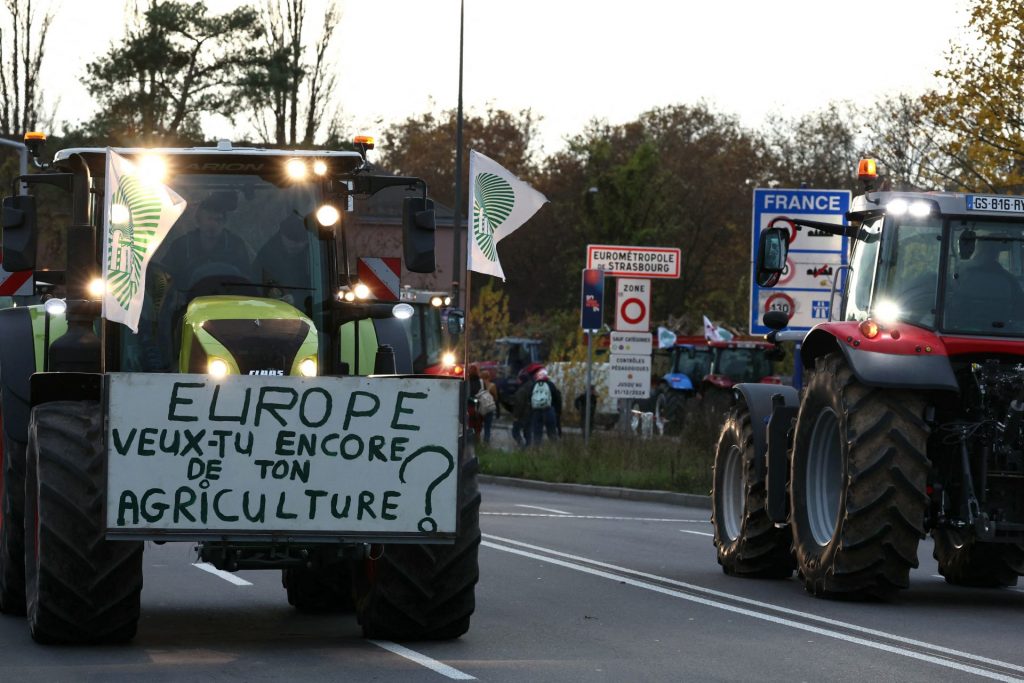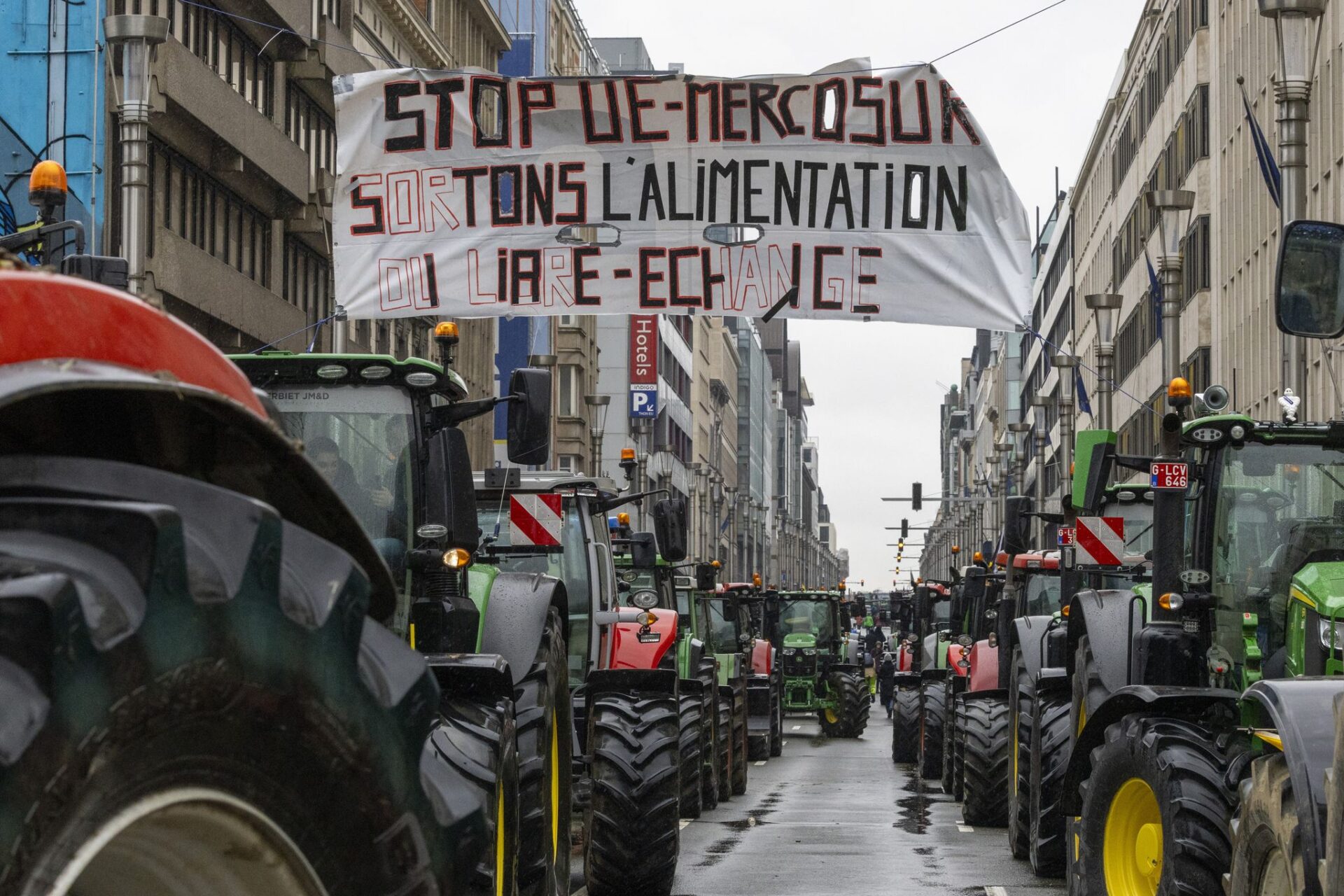 Have the article read by OpenAI (Beta). Please note that AI translations may take some time to process.
Have the article read by OpenAI (Beta). Please note that AI translations may take some time to process.The European Union and Mercosur countries are preparing for the final push to ratify a controversial free trade agreement – the so-called EU-Mercosur Association Agreement – that has been under discussion for twenty-five years.
The European Commission, pushed by countries such as Germany and Spain, seems inclined to sign the agreement, which will allow Latin American countries in particular to export greater quantities of beef, chicken or sugar without paying customs duties in Europe.
However, some EU countries have been blocking it going any further, with France leading the opposition. France is now trying to convince other EU countries to reach a blocking minority to oppose its adoption.
The EU-Mercosur deal, which includes Brazil, Argentina, Paraguay and Uruguay, seeks to establish one of the world’s largest free trade zones, encompassing over 700 million people. Its primary aim is to lower tariffs and boost trade. Bolivia, a new member of Mercosur, and Venezuela, which has been suspended since 2016, are not affected.
Put on the table in 1999, agreed in 2019 and yet never ratified, the pact continues to be rejected by European farmers concerned by unfair competition and dumping prices to the full advantage of South American products. The deal is also deemed to lack adequate environmental, social and health standards.
The EU is already a major market for Mercosur countries. According to the Mercosur website, in 2023 Brazil, Argentina, Uruguay and Paraguay exported a total of almost 24 billion Dollar (22.7 billion Euro) worth of agricultural and agri-food products to the EU. This represents 13.3 percent of the total exports of these four countries outside Mercosur.
Eurostat, for its part, estimates EU agricultural imports from Brazil, Argentina, Uruguay and Paraguay at 18.4 billion Euro in 2023 (excluding tobacco and salt). These four countries account for 12.6 percent of the 27 EU member states’ imports by value.
France and its farmers mount opposition to the deal
French farmers have long expressed frustration with declining incomes, strict EU environmental regulations and what they see as excessive government demands. Earlier this year, demonstrations included motorway blockades, leading the government to promise broad support.
In the farmers’ view, the agreement would lead to unfair competition, for example with a flood of meat from Argentina and Brazil that would not be subject to the strict EU health and environmental standards.
Less than a year after the historic protests, French farmers now took to the streets once more.
Starting on Sunday, November 17, farmers staged protests led by the agricultural union Fédération nationale des syndicats d’exploitants agricoles (FNSEA). FNSEA leader Arnaud Rousseau criticised the agreement, arguing that it fails to align with the Paris Climate Agreement and does not guarantee equal production standards.

On Tuesday, November 19, farmers backed by Coordination Rurale (CR), a hard-line farming union, set up a roadblock on the A9 motorway at the southern French town of Le Boulou, close to the border with Spain, blocking lorries but allowing cars through, an AFP journalist observed. The A9 motorway is a crucial trade route between the Iberian peninsula and the rest of Europe.
In a rare show of unanimity, the French political class has been backing the widespread opposition to the EU-Mercosur deal, and President Emmanuel Macron has been hammering home his rejection of the agreement “as it stands” during his tour of South America at the time of the protests.
On Wednesday, November 20, CR lifted the blockade on the Spanish border after an expression of support from Prime Minister Michel Barnier. “Your Prime Minister knows and respects farmers. I will do everything I can… uphold the very many commitments that have been made,” the former agriculture minister said.
Macron says France is not alone
Attending a G20 summit in Brazil on November 18 and 19, Macron said that France was not alone in opposing the accord. “Contrary to what many people think, France is not isolated and several countries are joining us,” the French President said.
Polish Prime Minister Donald Tusk’s pro-EU government on Tuesday (November 26) adopted a resolution opposing the current draft of the Mercosur deal. He said that Warsaw would not accept the free trade deal negotiated by the European Union and the Mercosur bloc “in this form,” joining the opposition against it led by France.
Earlier this month, the Polish agriculture ministry voiced “serious reservations” regarding the current draft of the EU-Mercosur agreement, warning that Polish and European producers could be “ousted from the EU market” if it is signed. The ministry warned the deal may hurt Polish poultry and beef, sugar and ethanol producers the most.
In Romania, the Alliance for Agriculture and Cooperation (AAC) has requested the country’s authorities to block the signing of the trade agreement, arguing that it will have a negative impact on agriculture and farmers in Romania and Europe, who comply with EU standards regarding agricultural and livestock production, environmental regulations, and produce food at the highest nutritional and quality standards.
Within the Italian government, positions on the agreement are divided. Agriculture minister Francesco Lollobrigida, a close ally of Italy’s far-right Prime Minister Giorgia Meloni, said “the EU-Mercosur treaty in its current form is not acceptable,” adding that “we must verify that Mercosur nations respect the same obligations we impose on our farmers in terms of workers’ rights and the environment.”
However, Foreign Minister Antonio Tajani, whose conservative Forza Italia party is also part of Meloni’s governing coalition, was more positive. “We are in favour in principle of making the agreement with Mercosur, I confirm it, but there are points that must be resolved because they are not fully satisfactory for Italy,” he said.
Pro-deal countries highlight economic and strategic value
While there is staunch opposition to the trade deal, some EU countries are in favour of advancing the agreement with Mercosur.
At a meeting of EU trade ministers in Brussels last week, the Spanish Secretary of State for Trade María Amparo López Senovilla expressed confidence that an upcoming technical round of negotiations for the agreement with Mercosur will be the last and that “substantial progress” can be made by December.
German Chancellor Olaf Scholz has called for the deal to “finally” be sealed after years of negotiations. “We have to finally get the Mercosur free trade agreement done now after more than 20 years,” Scholz said on the sidelines of the G20 summit in Brazil.
Portuguese Agriculture Minister José Manuel Fernandes has argued that the trade agreement between the EU and Mercosur should help reduce Portugal’s commercial deficit with Brazil. He said that “without Mercosur, we have an annual deficit of 500 million Euro, with the agreement I am convinced that this deficit in the agri-food and forestry sector can and will be reduced.”
Bulgaria’s Deputy Minister of Economy and Industry, Nikolay Pavlov, has stressed that it was of particular importance for the EU to continue its efforts to finalise the negotiations with Australia, Mexico and Mercosur, as well as those with countries in the Association of Southeast Asian Nations (ASEAN). In his words, in trade negotiations the EU should take an individual approach tailored to the level of economic development of each partner country.
Regarding Mercosur, Bulgaria would support a balanced agreement that protects the interests of EU businesses, especially farmers.
In Sweden, both the right wing government and most of the opposition are very much supporting the Mercosur-deal. The minister of agriculture, Peter Kullgren, claims that the deal actually would benefit the agriculture sector in Europe, with opening up for more exports.
“Sweden will be the clearest voice for free trade in this meeting and the months to come. Hopefully we can get more countries to walk on our path as well,” said Sweden’s trade minister Benjamin Dousa ahead of the EU trade ministers meeting in Brussels last week.
What’s next for the EU and Mercosur?
The executive vice president of the European Commission responsible for Trade, Valdis Dombrovskis, said last week that negotiations for an association agreement with Mercosur are “progressing”, but he did not want to give a deadline for its conclusion.
EU negotiators and their Mercosur partners will continue negotiating the final details of the text in view of the summit of Mercosur leaders in Montevideo, Uruguay, on December 5 and 6.
Fact check: World Bank urges to eliminate greenhouse gas emissions from agriculture
One of the main concerns of farmers in the European Union regarding the EU-Mercosur trade deal is the fact that they have to meet strict environmental standards – while countries in the Mercosur bloc do not. As a result, European farmers argue that they will be at a disadvantage to South American farmers if the agreement is signed.
Earlier this year, the World Bank issued a press release stating that almost a third of greenhouse gas emissions can be reduced in the global agriculture and food system by 2030. False messages circulating on social media in May this year were claiming that the World Bank had signed an agreement with Western nations to abolish agriculture by 2030.
The fact-checking team by German Press Agency dpa debunked these claims, explaining that the agreement is not about abolishing agriculture, but about changing agricultural processes to help reduce emissions.
Read the full fact check in German: https://dpa-factchecking.com/germany/240531-99-225799/
This article is published twice a week. The content is based on news by agencies participating in the enr.
